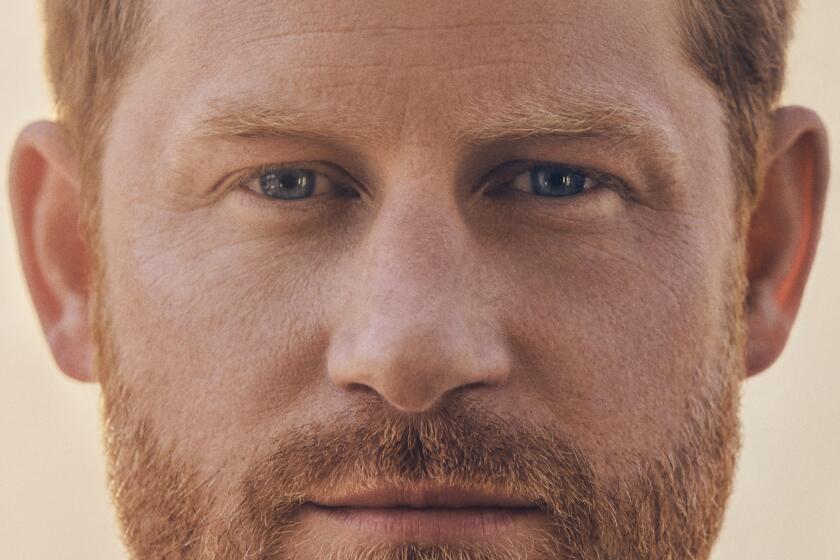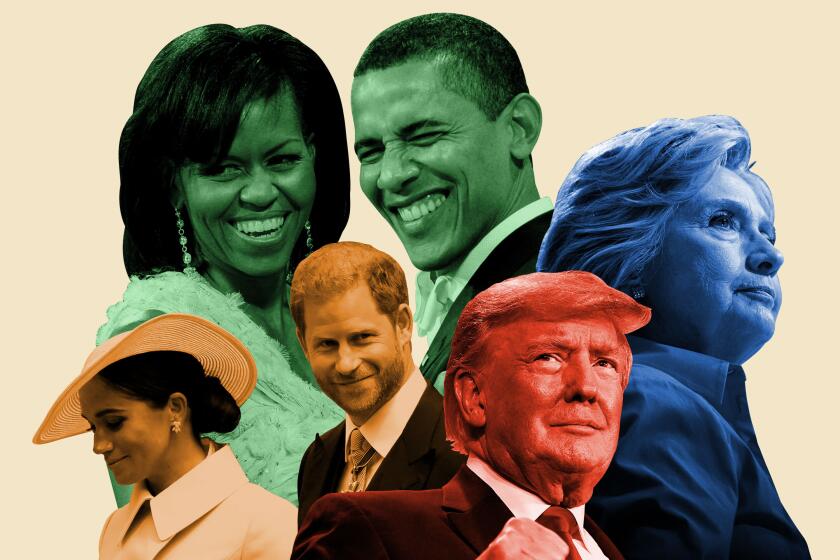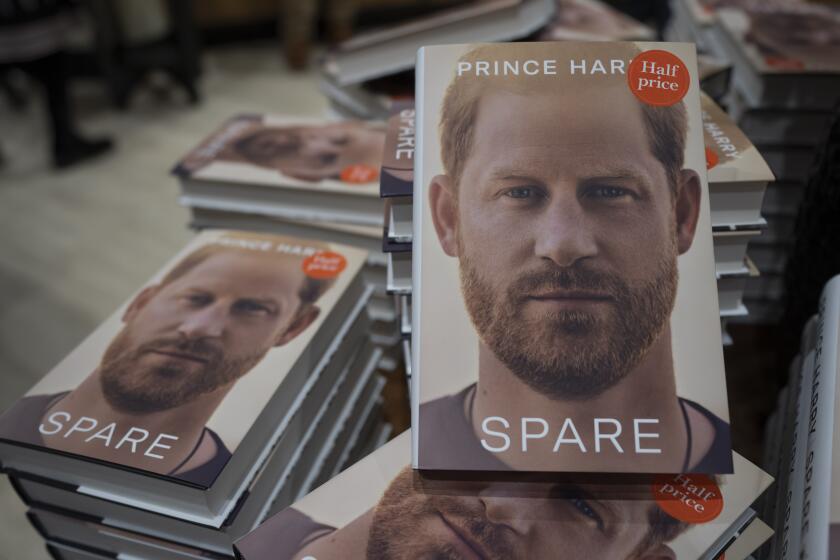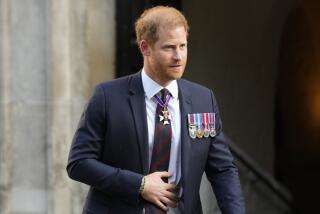Commentary: Prince Harry’s memoir mercilessly trashes the royal family. He didn’t go far enough
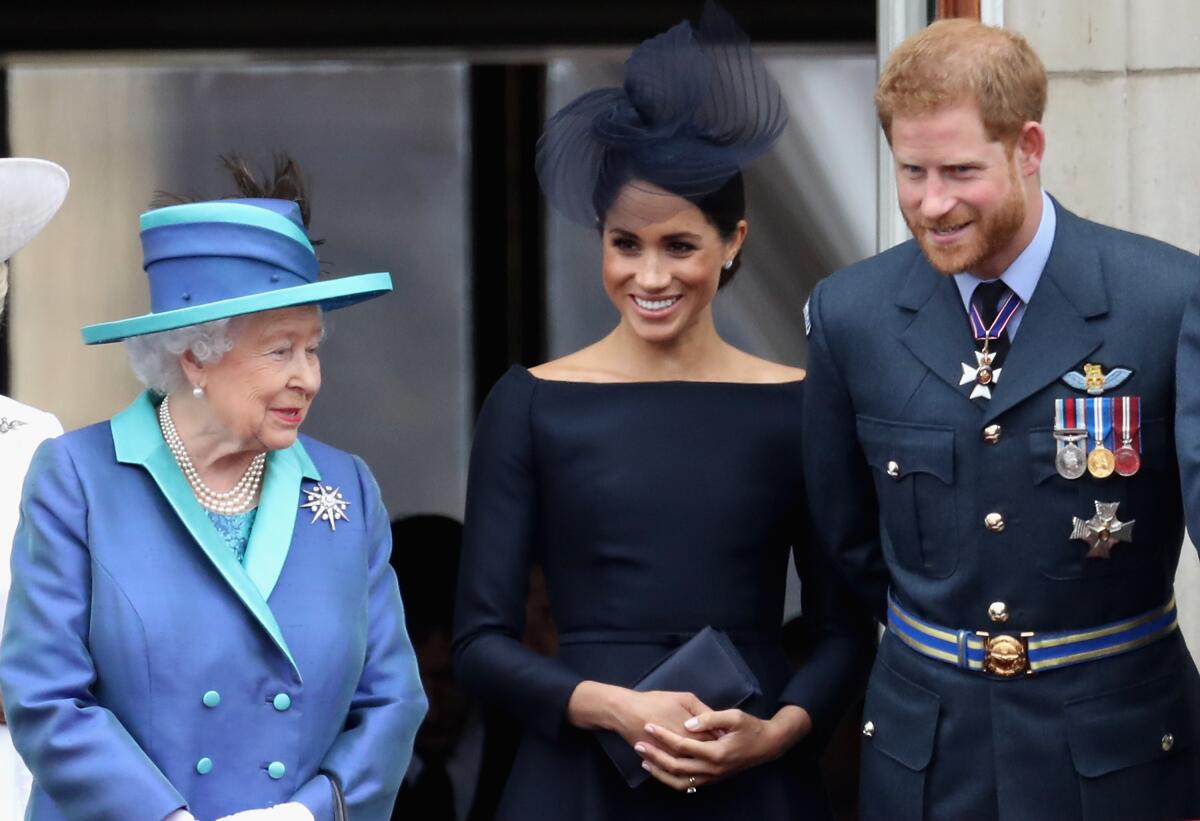
- Share via
In his memoir, “Spare,” Prince Harry spills more British tea than a certain band of revolutionaries did 250 years ago — with results that may be just as upsetting to the current monarch as the Boston Tea Party was to George III.
Many wondered if the tell-all, published last week, would contain enough new revelations to sustain public interest in the Duke and Duchess of Sussex, whose six-part docuseries “Harry & Meghan” premiered just last month on Netflix. The answer, so far, is a resounding yes: “Spare” is breaking sales records and has inspired more breathless headlines than virtually any other book in recent memory.
When it comes to juicy anecdotes, “Spare” is anything but: No tidbit is too salacious, too trifling or too controversial to make the cut. The erstwhile prince writes about losing his virginity to an older woman in a field behind a pub, tripping on mushrooms in Courteney Cox’s bathroom and sexy rendezvous with his now-wife, the former Meghan Markle, early in their courtship. He also offers more sobering details, like the exact number of people he killed while serving in Afghanistan (25) and the belief he clung to for many years that his mother, Princess Diana, did not die in a Paris car crash but had actually disappeared.
And he is unflinching when it comes to his family, portraying the Windsors as a cold, dysfunctional and ruthless clan in which hugs are beyond the pale but leaking stories to the Sun about your own kin is standard practice. In Harry’s telling, Charles is detached and relentlessly self-serving, William dull and peevish and Camilla a conniving stepmother straight out of Disney-villain central casting.
For all his anguished soul-baring and scandalous confessing, though, Harry can’t bring himself to identify, much less condemn, the real source of his woes: the monarchy itself. As I eagerly gobbled up every gossipy morsel about wedding seating Harry was willing to share, I kept waiting for him to go there and critique the institution that fostered such wild entitlement and bitter resentment in the first place.
Instead, he spends nearly 400 pages building a de facto case against the very concept of a hereditary sovereign — surely no one would choose to have an emotionally stunted dilettante like Charles in charge if they could — but ultimately dodges the very pertinent questions he raises about the dynasty he once epitomized.
For Harry, frostbitten todgers are fair game, but the “M” word is apparently the last real taboo.
“No one wants to hear a prince argue for the existence of a monarchy, any more than they want to hear a prince argue against it,” he writes in the closing pages of “Spare.” “My emotions are complicated on this subject, naturally, but my bottom-line position isn’t. I’ll forever support my Queen, my Commander in Chief, my Granny. Even after she’s gone. My problem has never been with the monarchy, or the concept of monarchy. It’s been with the press and the sick relationship that’s evolved between it and the Palace.”
If you’re reading Prince Harry’s memoir ‘Spare’ and wondering what a biro is, here’s a master list of the schools, nicknames and body parts you need to know.
The claim that Harry — who called his book “Spare,” after all — has no problem with the concept of a hereditary monarchy, one that almost inevitably pit him against his older brother and his father against them both, seems disingenuous.
He devotes many of the memoir’s pages to detailing the ways, overt and subtle, he was made to feel disposable and inferior from the moment of his birth, for no reason other than William got there first. Early on, Harry recalls how their bedroom at Balmoral was divided into two halves — his brother’s larger and more luxuriously appointed. Later, in adulthood, this tension curdles in unexpected ways. William, allegedly resentful that he didn’t get to pick what he wore on his own wedding day, tries to bully Harry into shaving his beard. Charles does not come off any better, looking the other way as his wife, Camilla, allegedly feeds stories to the tabloids about her stepsons in exchange for favorable coverage and constantly putting his personal interests ahead of theirs because, well, he can.
The pettiness described in “Spare” is staggering, with inane disputes over lip gloss rising to near-constitutional crises. And British republicans, sensing a moment of opportunity to revive their campaign against the monarchy after the death of Queen Elizabeth II, have glommed onto the ugly family drama.
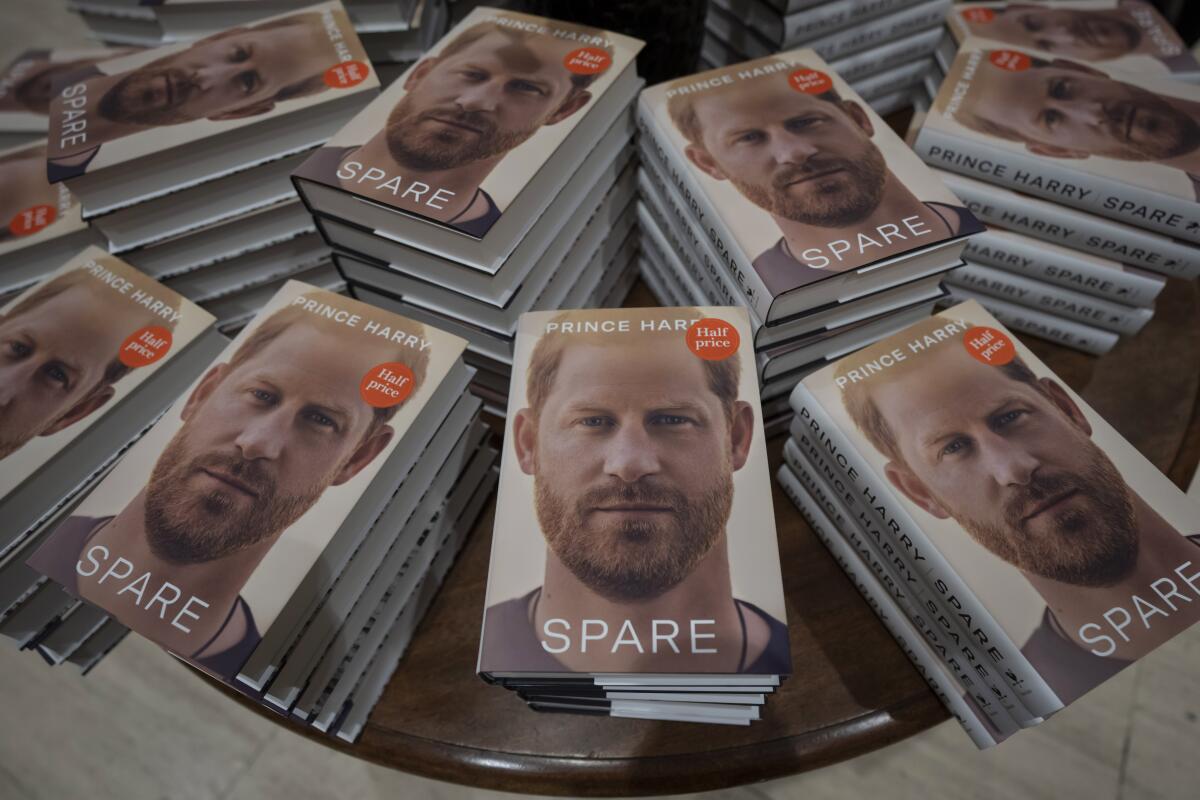
“This row is destroying the monarchy and any sense of mystery or mythology that has sustained it in the past. We can now see very ordinary, unimpressive people who are prone to quick tempers, fits of violence and petty jealousies,” said Graham Smith, chief executive of the anti-monarchist group Republic, in a recent press release. “Harry has also highlighted the cruelty of an institution that raises children according to a rigid pecking order, telling the younger ones they must always defer to the rights and rank of their siblings. This is no way to raise a family, it is no way to govern a country.”
Indeed, it doesn’t take a child psychologist to know that Harry grew up in an unhealthy environment, deprived of physical affection while being made to perform for the cameras. “No matter how much you might love someone, you could never cross the chasm between, say, monarch and child. Or heir and spare. Physically but also emotionally,” he writes. “The older generation maintained a nearly zero-tolerance prohibition on physical contact. No hugs, no kisses, no pats.” This, apparently, included moments of intense tragedy, like Diana’s death. (Harry got a hand on the knee from his father.) When William embraced Harry upon his return home after a scary incident on the front lines in Afghanistan, it amounted to “a flamboyant, unprecedented display of physical affection.”
Clintons. Obamas. British royals. How civic leaders became the industry’s ‘coin of the realm’ — and whether the trend is worth more than money.
Whether he’s being willfully naive or is simply in denial, Harry also seems to believe there is a meaningful distinction between the British press and the institution of the monarchy. Yet the two organisms share a deeply symbiotic relationship, and function as interdependent parts of a system that preserves wealth and power for a scant few. Saying “my problem is not with the monarchy, it’s with the press” is like saying “my problem is not with sharks, it’s with their teeth.”
And, on some level, Harry knows the institution is difficult to defend in a democratic, post-colonial era. As James Holt, a former palace spokesperson who now runs the Archewell Foundation, says in the first episode of “Harry & Meghan”: “When you actually put [the monarchy] under pressure and you say that there is a family anointed by God, by blood, to rule over this country and other countries around the world, it’s a difficult conversation to have. And so in order for the institution to survive, it has to modernize, but it also has to have mass popular support.”
That support, in turn, depends on a constant stream of publicity — most of it the good kind, celebrating the lavish weddings, jubilees and funerals but also the countless dutiful ribbon-cutting ceremonies. Put another way: The royals need the press to cover all their good deeds, otherwise we might start asking where those tiaras came from.
And this dependence on publicity breeds paranoia and resentment within the family. Harry recalls a particularly tense Christmas at Sandringham, marred by bitterness over the Court Circular — the annual record of the royal family’s official engagements, which inspired the press to draw conclusions each year about who was a lazy mooch and who was a workhorse. “Maybe the stress around all this stemmed from the overarching stress about the monarchy itself,” Harry writes. “The family was feeling the tremors of global change, hearing the cries of critics who said the monarchy was outdated.”
‘Spare’ no details: Full coverage of Prince Harry’s book, Netflix series with Meghan Markle and more
Everything you need to know about Prince Harry’s book “Spare” and how Harry and Meghan Markle have shared their story.
Harry may be reluctant to condemn the institution more forcefully because of how fully he seems to have internalized the imperialist mindset. He devotes nearly a third of “Spare” to his military service in Iraq and Afghanistan, without thoroughly contemplating the role of the British Empire in their histories. And some of the more cringeworthy passages in “Spare” pertain to his experiences in Africa, a continent he seems genuinely to love but writes about using naive cliches: “In Africa all distance dissolved. All creatures mingled freely.” He even admits to considering getting a tattoo of Botswana on his foot during a drunken trip to Las Vegas. Instead, he winds up back in the tabloids after losing a round of strip poker.
Since they walked away from royal life three years ago, Harry and Meghan have assiduously rebranded themselves as progressive-ish celebrity philanthropists and multimedia entrepreneurs. Meghan’s Spotify podcast “Archetypes” aims to dismantle “the labels that try to hold women back,” while the docuseries “Live to Lead,” their second project at Netflix, earnestly profiles left-leaning icons like Ruth Bader Ginsburg.
They earned their liberal cred, such as it is, by distancing themselves from an archaic institution and calling out unfair treatment Meghan received based on her race, class and gender. Yet the Sussexes have yet to renounce their royal titles. In an otherwise friendly interview for “60 Minutes,” Anderson Cooper pointedly asked why they hadn’t taken this final step. The (still) Duke of Sussex responded with a shrug: “And what difference would that make?”
The answer is: a big one.
More to Read
Sign up for our Book Club newsletter
Get the latest news, events and more from the Los Angeles Times Book Club, and help us get L.A. reading and talking.
You may occasionally receive promotional content from the Los Angeles Times.
